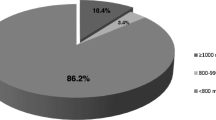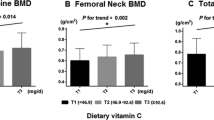Abstract
Introduction
Vitamin K functions as a co-factor in the post-translational carboxylation of several bone proteins, including osteocalcin.
Aim
The aim of this study was to investigate the relationship between vitamin K1 intake and bone mineral density (BMD) and fracture risk in a perimenopausal Danish population.
Design
The study was performed within the Danish Osteoporosis Prevention Study (DOPS), including a population-based cohort of 2,016 perimenopausal women. During the study approximately 50% of the women received hormone replacement therapy (HRT). Associations between vitamin K1 intake and BMD were assessed at baseline and after 5-years of follow-up (cross-sectional design). Moreover, associations between vitamin K1 intake and 5-year and 10-year changes in BMD were studied (follow-up design). Finally, fracture risk was assessed in relation to vitamin K1 intake (nested case–control design).
Results
In our cohort, dietary vitamin K1 intake (60 μg/day) was close to the daily intake recommended by the Food and Agriculture Organization (FAO). Cross-sectional and longitudinal analyses showed no associations between intake of vitamin K1 and BMD of the femoral neck or lumbar spine. Neither did BMD differ between those 5% that had the highest vitamin K1 intake and those 5% that had the lowest. During the 10-years of follow-up, 360 subjects sustained a fracture (cases). In a comparison between the cases and 1,440 controls, logistic regression analyses revealed no difference in vitamin K1 intake between cases and controls.
Conclusion
In a group of perimenopausal and early postmenopausal women, vitamin K1 intake was not associated with effects on BMD or fracture risk.
Similar content being viewed by others
References
Booth SL, Suttie J (1998) Dietary intake and adequacy of vitamin K1. J Nutr 128:785–788
Hara K, Akiyama Y, Tajima T, Shiraki M (1993) Menatetrenone inhibits bone resorption partly through inhibition of PGE2 synthesis in vitro. J Bone Miner Res 8:535–542
Takeuchi Y, Suzawa M, Fukumoto S, Fujita T (2000) Vitamin K(2) inhibits adipogenesis, osteoclastogenesis, and ODF/RANK ligand expression in murine bone marrow cell cultures. Bone 27:769–776
Berkner KL (2000) The vitamin K-dependent carboxylase. J Nutr 130:1877–1880
Kalkwarf HJ, Khoury JC, Bean J, Elliot JG (2004) Vitamin K, bone turnover, and bone mass in girls. Am J Clin Nutr 80:1075–1080
Szulc P, Arlot M, Chapuy MC, Duboeuf F, Meunier PJ, Delmas PD (1994) Serum undercarboxylated osteocalcin correlates with hip bone mineral density in elderly women. J Bone Miner Res 9:1591–1595
Booth SL, Broe KE, Peterson JW, Cheng DM, Dawson-Hughes B, Gundberg CM, Cupples LA, Wilson PWF, Kiel DP (2004) Associations between vitamin K biochemical measures and bone mineral density in men and women. J Clin Endocrinol Metab 89:4904–4909
Szulc P, Chapuy MC, Meunier PJ, Delmas PD (1996) Serum undercarboxylated osteocalcin is a marker of the risk of hip fracture: a three year follow-up study. Bone 18:487–488
Vergnaud P, Garnero P, Meunier PJ, Breart G, Kamihagi K, Delmas PD (1997) Undercarboxylated osteocalcin measured with a specific immunoassay predicts hip fracture in elderly women: the EPIDOS study. J Clin Endocrinol Metab 82:719–724
Szulc P, Chapuy MC, Meunier PJ, Delmas PD (1993) Serum undercarboxylated osteocalcin is a marker of the risk of hip fracture in elderly women. J Clin Invest 91:1769–1774
Hodges SJ, Akesson K, Vergnaud P, Obrant K, Delmas PD (1993) Circulating levels of vitamins K1 and K2 decreased in elderly women with hip fracture. J Bone Miner Res 8:1241–1245
Hart JP, Shearer MJ, Klenerman L, Catterall A, Reeve J, Sambrook PN, Dodds RA, Bitensky L, Chayen J (1985) Electrochemical detection of depressed circulating levels of vitamin K1 in osteoporosis. J Clin Endocrinol Metab 60:1268–1269
Luukinen H, Kakonen SM, Pettersson K, Koski K, Laippala P, Lovgren T, Kivela SL, Vaananen HK (2000) Strong prediction of fractures among older adults by the ratio of carboxylated to total serum osteocalcin. J Bone Miner Res 15:2473–2478
Resch H, Pietschmann P, Krexner E, Willvonseder R (1991) Decreased peripheral bone mineral content in patients under anticoagulant therapy with phenprocoumon. Eur Heart J 12:439–441
Fiore CE, Tamburino C, Foti R, Grimaldi D (1990) Reduced axial bone mineral content in patients taking an oral anticoagulant. South Med J 83:538–542
Caraballo PJ, Gabriel SE, Castro MR, Atkinson EJ, Melton LJ III (1999) Changes in bone density after exposure to oral anticoagulants: a meta-analysis. Osteoporos Int 9:441–448
Caraballo PJ, Heit JA, Atkinson EJ, Silverstein MD, O’Fallon WM, Castro MR, Melton III LJ (1999) Long-term use of oral anticoagulants and the risk of fracture. Arch Intern Med 159:1750–1756
Jamal SA, Browner WS, Bauer DC, Cummings SR (1998) Warfarin use and risk for osteoporosis in elderly women. Study of Osteoporotic Fractures Research Group. Ann Intern Med 128:829–832
Rosen HN, Maitland LA, Suttie JW, Manning WJ, Glynn RJ, Greenspan SL (1993) Vitamin K and maintenance of skeletal integrity in adults. Am J Med 94:62–68
Booth SL, Broe KE, Gagnon DR, Tucker KL, Hannan MT, McLean RR, Dawson-Hughes B, Wilson PW, Cupples LA, Kiel DP (2003) Vitamin K intake and bone mineral density in women and men. Am J Clin Nutr 77:512–516
Booth SL, Tucker KL, Chen H, Hannan MT, Gagnon DR, Cupples LA, Wilson PWF, Ordovas J, Schaefer EJ, Dawson-Hughes B, Kiel DP (2000) Dietary vitamin K intakes are associated with hip fracture but not with bone mineral density in elderly men and women. Am J Clin Nutr 71:1201–1208
Feskanich D, Weber P, Willett WC, Rockett H, Booth SL, Colditz GA (1999) Vitamin K intake and hip fractures in women: a prospective study. Am J Clin Nutr 69:74–79
Jadad AR (1998) Randomised controlled trials. A user’s guide, 1st edn. BMJ Books, London
Mosekilde L, Hermann AP, Beck NH, Charles P, Nielsen SP, Sorensen OH (1999) The Danish Osteoporosis Prevention Study (DOPS): project design and inclusion of 2000 normal perimenopausal women. Maturitas 31:207–219
Vestergaard P, Hermann AP, Gram J, Jensen LB, Kolthoff N, Abrahamsen B, Brot C, Eiken P (1997) Improving compliance with hormonal replacement therapy in primary osteoporosis prevention. Maturitas 28:137–145
Moller A (1989) Food composition tables. Publication No. SC3. The Danish National Food Agency, Copenhagen
Abrahamsen B, Gram J, Hansen TB, Beck-Nielsen H (1995) Cross calibration of QDR-2000 and QDR-1000 dual-energy X-ray densitometers for bone mineral and soft-tissue measurements. Bone 16:385–390
The Food and Nutrition Board (2000) Dietary reference intakes for vitamin A, vitamin K, arsenic, boron, chromium, copper, iodine, iron, manganese, molybdenum, nickel, silicon, vanadium, and zinc. National Academy Press, Washington, DC
Anon (2002) Human vitamin and mineral requirements: report of a joint FAO/WHO expert consultation, Bangkok, Thailand. World Health Organization, Food and Agriculture Organization of the United Nations, Rome, Italy
Thane CW, Paul AA, Bates CJ, Bolton-Smith C, Prentice A, Shearer MJ (2002) Intake and sources of phylloquinone (vitamin K1): variation with socio-demographic and lifestyle factors in a national sample of British elderly people. Br J Nutr 87:605–613
Price R, Shearer MJ, Bolton-Smith C (1996) Daily and seasonal variation in phylloquinone (vitamin K1) intake in Scotland. Proc Nutr Soc 55:244A
Booth SL, Sokoll LJ, O’Brien ME, Tucker K, Dawson-Hughes B, Sadowski JA (1995) Assessment of dietary phylloquinone intake and vitamin K status in postmenopausal women. Eur J Clin Nutr 49:832–841
Michels KB, Bingham SA, Luben R, Welch AA, Day NE (2004) The effect of correlated measurement error in multivariate models of diet. Am J Epidemiol 160:59–67
Ambrosini GL, de Klerk NH, Musk AW, Mackerras D (2001) Agreement between a brief food frequency questionnaire and diet records using two statistical methods. Public Health Nutr 4:255–264
McKeown NM, Rasmussen HM, Charnley JM, Wood RJ, Booth SL (2000) Accuracy of phylloquinone (vitamin K-1) data in 2 nutrient databases as determined by direct laboratory analysis of diets. J Am Diet Assoc 100:1201–1204
Braam LA, Knapen MH, Geusens P, Brouns F, Hamulyak K, Gerichhausen MJ, Vermeer C (2003) Vitamin K1 supplementation retards bone loss in postmenopausal women between 50 and 60 years of age. Calcif Tissue Int 73:21–26
Knapen MH, Hamulyak K, Vermeer C (1989) The effect of vitamin K supplementation on circulating osteocalcin (bone Gla protein) and urinary calcium excretion. Ann Intern Med 111:1001–1005
Acknowledgments
The project was made possible by a grant from Karen Elise Jensen’s Foundation, Denmark. Drugs were provided free of charge by Novo Nordic, Denmark, Leo Pharmaceutical products A/S, Denmark, and Ciba Geigy, Denmark.
Author information
Authors and Affiliations
Corresponding author
Rights and permissions
About this article
Cite this article
Rejnmark, L., Vestergaard, P., Charles, P. et al. No effect of vitamin K1 intake on bone mineral density and fracture risk in perimenopausal women. Osteoporos Int 17, 1122–1132 (2006). https://doi.org/10.1007/s00198-005-0044-3
Received:
Accepted:
Published:
Issue Date:
DOI: https://doi.org/10.1007/s00198-005-0044-3




